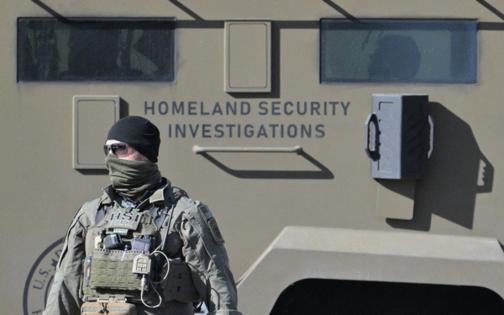Colorado enacts new guardrails on federal immigration enforcement
Published in News & Features
DENVER — Colorado Gov. Jared Polis signed a new law Friday to further limit federal immigration authorities’ access to public buildings and local governments’ ability to share information with those authorities.
Under Senate Bill 276, local governmental entities and their employees cannot share personal identifying information with federal authorities, unless required to by a subpoena or warrant. Public buildings — from government buildings to libraries and public schools — must also adopt policies preventing immigration enforcement from entering nonpublic areas of buildings without a warrant.
Jails also cannot delay a person’s regularly scheduled release for immigration purposes.
The bill, backed by Democratic lawmakers, was a direct response to President Donald Trump’s crackdown on immigration — a mass wave of arrests and deportations that Trump previewed during an October rally in the state. Immigration raids have since unfolded in metro Denver, including the arrest of a prominent activist.
The Trump administration is also suing the state — and the city of Denver — over previous laws limiting interaction with federal authorities. That lawsuit was announced as lawmakers were actively debating SB-276. It remains ongoing.
“This is a testament to Colorado’s unwavering commitment to ensuring fundamental human dignity and building trust, safety and respect,” Sen. Julie Gonzales, a Democrat and one of the bill’s sponsors, said in a statement. “ … Nearly every Democrat in the General Assembly voted to affirm that the division, fearmongering, and chaos coming from the Trump administration will not deter us. May history remember those who stepped up to fight to affirm constitutional protections for all Coloradans, and those who did not.”
The bill’s other sponsors were Democratic Reps. Lorena Garcia and Elizabeth Velasco and Sen. Mike Weissman.
In a statement Friday, Polis, who had been leery of SB-276, wrote that despite the bill’s passage into law, “Colorado is not a sanctuary state.” He’d previously told reporters that he welcomed federal immigration authorities’ presence here, though he also acknowledged that he wished he had more insight into what exactly they were doing.
“It is important for local law enforcement to continue to fully cooperate with other state and federal agencies on criminal matters, including the execution of warrants,” he wrote. “In fact, this is their duty. But to be clear, state and local law enforcement cannot be commandeered to enforce federal civil immigration laws and (be) taken away from fighting crime.”
SB-276 also blocks military forces from other states from entering Colorado, unless ordered by Polis or the federal government. It also ends the collection of certain affidavits filed by undocumented immigrants, and it expands current law allowing immigrants to contest certain plea agreements.
“Through the passage of SB 25-276, we have ensured that Colorado will be a more prosperous, resilient, welcoming state for all who call it home,” Crystal Murillo, the executive director of Colorado People’s Alliance, said in a statement. “This legislation reflects Colorado values at its finest: fairness, opportunity, and respect for human dignity.”
©2025 MediaNews Group, Inc. Visit at denverpost.com. Distributed by Tribune Content Agency, LLC.







Comments